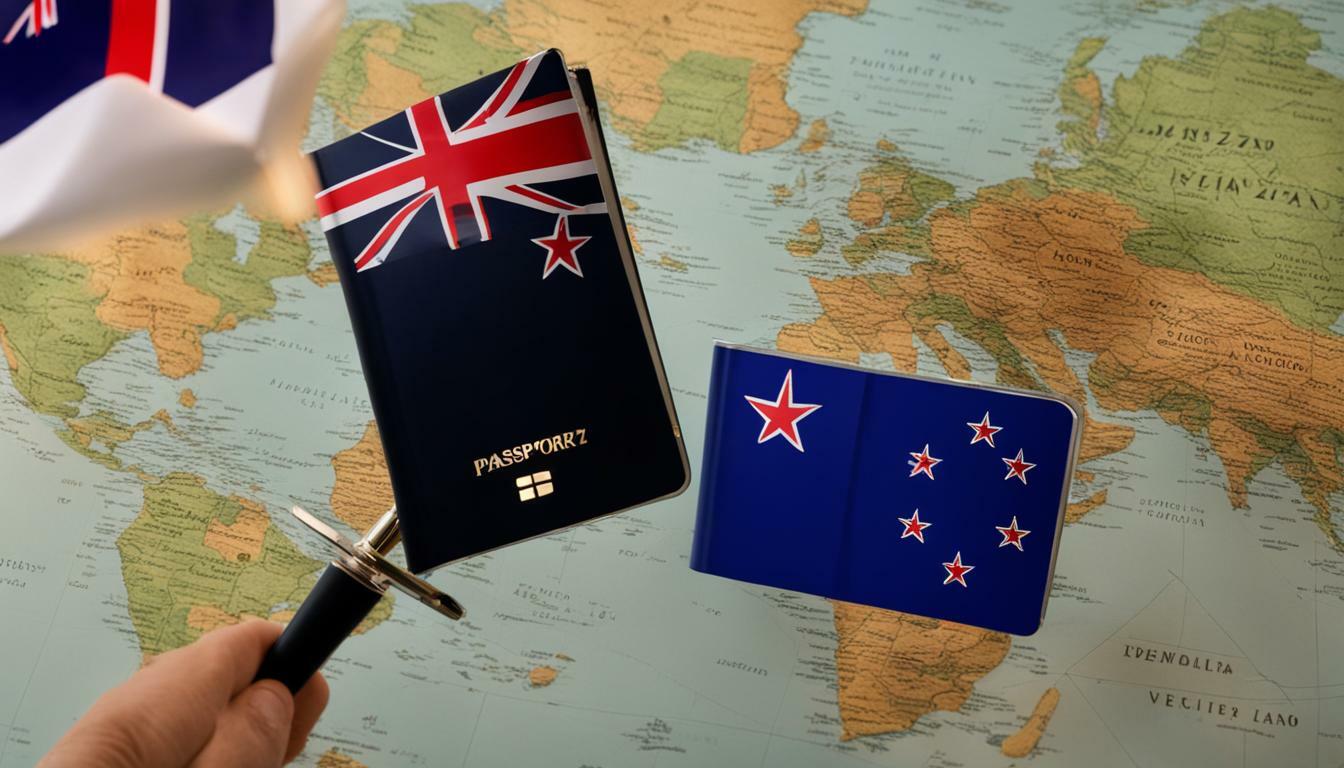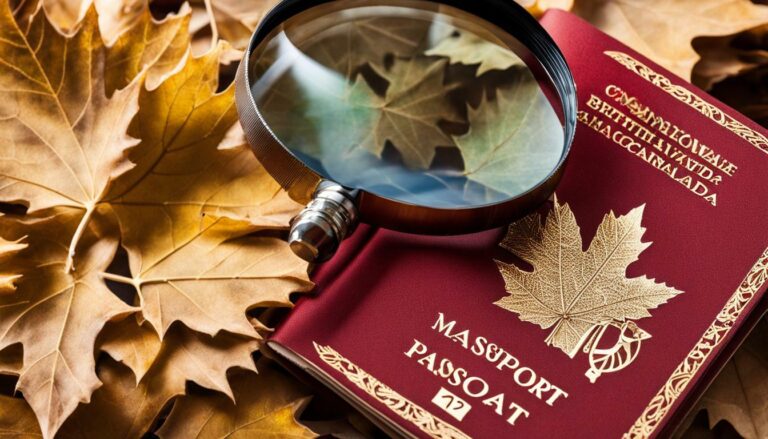Exploring: Does NZ Allow Dual Citizenship for Permanent Residents?
Dual citizenship can be a complex topic, especially for permanent residents in New Zealand who are considering acquiring New Zealand citizenship. Understanding the rules and requirements is essential for those looking to navigate the process successfully. In this article, we will explore the concept of dual citizenship in New Zealand, including eligibility criteria, disclosure of other citizenship, the impact of other country’s rules, giving up other citizenship, dual citizenship for children born in New Zealand, the attractiveness of New Zealand citizenship, pathways to citizenship, eligibility requirements, and the dual citizenship application process.
Key Takeaways:
- New Zealand allows dual citizenship, but it depends on the rules of the other country.
- When applying for New Zealand citizenship, individuals must disclose any other citizenship they hold.
- If the other country allows dual citizenship, individuals can retain both citizenships.
- If the other country does not allow dual citizenship, individuals may have to give up their other citizenship when they become New Zealand citizens.
- Children born in New Zealand are automatically New Zealand citizens if at least one parent is a New Zealand citizen or permanent resident, but obtaining citizenship in another country will depend on that country’s rules.
Understanding Dual Citizenship in New Zealand
Dual citizenship refers to an individual holding citizenship of two countries simultaneously, and in the case of permanent residents in New Zealand, it is essential to understand the rules and requirements for dual citizenship eligibility. New Zealand allows dual citizenship, but whether an individual can acquire it depends on the rules of the other country involved.
When applying for New Zealand citizenship, individuals are required to disclose any other citizenship they hold. If the other country allows dual citizenship, individuals can retain both citizenships. This means they can enjoy the benefits and privileges of being citizens of both countries. However, it’s important to note that if the other country does not permit dual citizenship, individuals may have to give up their other citizenship upon becoming New Zealand citizens.
For children born in New Zealand, they are automatically granted New Zealand citizenship if at least one parent is a New Zealand citizen or permanent resident. However, whether they can obtain citizenship in another country will depend on that country’s rules and regulations regarding dual citizenship.
Dual Citizenship Requirements in New Zealand
In order to be eligible for New Zealand citizenship, individuals must meet certain requirements. First and foremost, they must have been a resident of New Zealand for at least 5 years. This residency requirement ensures that individuals have established a strong connection to the country and its values.
Additionally, individuals must meet English proficiency and character requirements. This helps to ensure that prospective citizens have the necessary language skills and good moral character to become valuable members of the New Zealand community.
| Requirements for Dual Citizenship in New Zealand: |
|---|
| Resident of New Zealand for at least 5 years; |
| Meet English proficiency and character requirements; |
New Zealand’s dual citizenship process offers various pathways to citizenship, including through descent, marriage, and grant. These pathways provide individuals with different options for acquiring New Zealand citizenship based on their unique circumstances and connections to the country.
Overall, New Zealand’s approach to dual citizenship allows individuals to enjoy the benefits of being citizens of multiple countries, as long as the rules and requirements of both countries permit it. This flexibility, along with New Zealand’s political stability, safe banking, business freedom, high quality of life, healthcare and education systems, and friendly population, makes it an attractive destination for those seeking dual citizenship.
Disclosure of Other Citizenship
When applying for New Zealand citizenship, individuals must disclose any other citizenship they hold to ensure transparency and compliance with the country’s immigration laws. This requirement is in place to prevent any potential conflicts of interest and to accurately assess an individual’s eligibility for dual citizenship.
For individuals seeking dual citizenship in New Zealand, it is important to consider the rules and regulations of the other country involved. If the other country allows dual citizenship, individuals can retain both citizenships without any issues. However, if the other country does not permit dual citizenship, individuals may be required to renounce their other citizenship when they become New Zealand citizens.
The disclosure of other citizenship is a crucial step in the dual citizenship application process. It is important for individuals to provide accurate and up-to-date information regarding their citizenship status. Failure to disclose any other citizenship could result in delays or even denials of the citizenship application.
Table: Dual Citizenship Disclosure Process
| Step | Description |
|---|---|
| 1 | Complete the citizenship application form |
| 2 | Provide accurate information regarding current citizenship(s) |
| 3 | Submit supporting documentation, such as passports or citizenship certificates |
| 4 | Undergo citizenship interviews and assessments |
| 5 | Receive dual citizenship approval or be required to give up other citizenship(s) |
By adhering to the disclosure requirements for other citizenship, individuals can ensure a smooth and transparent process when applying for dual citizenship in New Zealand.
Dual Citizenship and Other Country’s Rules
The ability to retain dual citizenship in New Zealand depends on the rules and regulations of the other country involved, but it can offer numerous advantages for individuals seeking to have a connection with both nations. Dual citizenship allows individuals to enjoy the benefits and privileges of being a citizen in both countries simultaneously. It can provide opportunities for travel, work, and investments in both nations, enhancing cultural, social, and economic ties.
When considering dual citizenship, it is essential to understand the requirements and limitations set by the other country. Some nations fully recognize and allow their citizens to hold dual citizenship, while others may restrict or prohibit dual citizenship altogether. Understanding these regulations is crucial to avoid any legal issues or conflicts.
New Zealand, as a dual citizenship-friendly country, welcomes individuals who have citizenship in other nations. However, it is important to note that the New Zealand citizenship application process requires applicants to disclose any other citizenship they hold. Transparency during the application process is highly valued, and individuals must provide accurate information regarding their dual citizenship status.
Dual citizenship can provide individuals with numerous benefits. It allows them to access a wider range of opportunities, such as living and working in both countries, owning property, and enjoying social benefits. Moreover, dual citizens can participate in the political processes of both nations, exercising their rights to vote and have a say in the governance of their respective countries. It also offers a sense of belonging and connection to multiple cultures, fostering diversity and global understanding.
| Advantages of Dual Citizenship in New Zealand |
|---|
| Enhanced travel opportunities and visa-free access to more countries |
| Access to social benefits, education, and healthcare systems in both countries |
| Ability to work and invest in both nations |
| Participation in political processes and exercising voting rights in both countries |
| Preservation of cultural identity and connection to multiple cultures |
Giving Up Other Citizenship
In cases where the other country does not permit dual citizenship, individuals applying for New Zealand citizenship may have to give up their current citizenship. While New Zealand allows dual citizenship, it ultimately depends on the rules and regulations of the other country involved. Transparency is key during the application process, and individuals must disclose any other citizenship they hold when applying for New Zealand citizenship.
For those whose other country allows dual citizenship, they can retain both citizenships and enjoy the benefits that come with it. However, if the other country does not permit dual citizenship, individuals may be required to relinquish their other citizenship when they become New Zealand citizens. This can be a difficult decision for some, as it involves letting go of a part of their identity and the privileges that come with it.
It is important to note that the eligibility for dual citizenship in New Zealand can vary depending on the individual’s circumstances. One such scenario is for children born in New Zealand to at least one parent who is a New Zealand citizen or permanent resident. While they automatically become New Zealand citizens, the acquisition of citizenship in the other country will depend on the laws and regulations of that country.
| Benefits of Dual Citizenship: |
|---|
| Visa-free travel to multiple countries |
| Access to social services and benefits in both countries |
| Ability to live, work, and study in two countries |
| Opportunities for international business and investment |
New Zealand is an attractive destination for those seeking dual citizenship. The country offers political stability, a robust banking system, and business freedom, making it an ideal place for wealthy investors and entrepreneurs. Additionally, New Zealand provides a high quality of life, excellent healthcare and education systems, and a friendly and inclusive population.
There are various pathways to acquire New Zealand citizenship, including through descent, marriage, and grant. Each pathway has its own specific requirements, and individuals must meet the eligibility criteria, such as being a resident for at least 5 years and demonstrating English proficiency and good character.
Dual Citizenship for Children Born in New Zealand
Children born in New Zealand are automatically granted New Zealand citizenship if at least one parent is a New Zealand citizen or permanent resident. This ensures that they are able to enjoy the benefits and privileges that come with being a New Zealand citizen, such as access to education, healthcare, and social welfare programs. However, their eligibility for dual citizenship may depend on the rules of the other country.
If the other country also allows dual citizenship, then these children have the potential to acquire dual citizenship. This means they can hold both New Zealand citizenship and the citizenship of the other country simultaneously. Having dual citizenship can provide them with the opportunity to fully embrace and connect with both cultures, as well as enjoy the rights and privileges of being a citizen in both countries.
It is important for parents to thoroughly research and understand the laws and regulations regarding dual citizenship in both New Zealand and the other country. Some countries may have restrictions or limitations on dual citizenship, and it is crucial to comply with their rules to ensure the legal status of the child. Consulting with immigration lawyers or authorities in both countries can provide parents with the necessary guidance and information to navigate the process smoothly.
| Citizenship Scenario | Eligibility for Dual Citizenship |
|---|---|
| New Zealand Citizen Parent + Citizen of Country X Parent | Dual citizenship may be possible if Country X allows dual citizenship |
| New Zealand Citizen Parent + Permanent Resident of Country X Parent | Child is automatically granted New Zealand citizenship; eligibility for dual citizenship depends on Country X’s rules |
| Permanent Resident of New Zealand Parent + Citizen of Country X Parent | Child is automatically granted New Zealand citizenship; eligibility for dual citizenship depends on Country X’s rules |
| Permanent Resident of New Zealand Parent + Permanent Resident of Country X Parent | Child is automatically granted New Zealand citizenship; eligibility for dual citizenship depends on Country X’s rules |
It should be noted that the process and requirements for acquiring dual citizenship for children born in New Zealand can vary depending on the country involved. Parents should seek professional advice and thoroughly understand the legal implications and obligations associated with dual citizenship before proceeding with any applications or decisions.
Attractiveness of New Zealand Citizenship
New Zealand citizenship offers a range of appealing attributes, making it an attractive option for individuals considering dual citizenship. This island nation, known for its stunning landscapes and vibrant culture, also boasts numerous benefits that make it an ideal choice for those seeking to expand their global horizons.
Political Stability and Safe Banking
New Zealand has long been recognized for its stable political climate, providing a secure environment for residents and citizens alike. Additionally, the country’s banking system is known for its reliability and security, making it an attractive destination for individuals looking to protect their assets.
Business Freedom and High Quality of Life
Entrepreneurs and investors find New Zealand particularly appealing due to its high degree of business freedom. The country offers a favorable regulatory environment, making it easier to start and grow a business. Moreover, New Zealand consistently ranks high in quality of life indexes, with its clean and safe cities, excellent healthcare and education systems, and diverse recreational opportunities.
Friendly Population and English Proficiency
New Zealanders, or “Kiwis” as they are affectionately known, are renowned for their welcoming and friendly nature. This warm and inclusive culture contributes to a sense of belonging and community for those who choose to become New Zealand citizens. Furthermore, English is the primary language spoken in New Zealand, making integration and communication seamless for English-speaking individuals.
In summary, New Zealand’s dual citizenship process presents a valuable opportunity for individuals seeking to enhance their global mobility and expand their personal and professional horizons. With its stable political climate, safe banking industry, business freedom, high quality of life, friendly population, and English proficiency, New Zealand offers a compelling case for those considering dual citizenship.
| Benefits of New Zealand Citizenship | Summary |
|---|---|
| Political Stability | Provides a secure environment for residents and citizens. |
| Safe Banking | Offers a reliable and secure banking system. |
| Business Freedom | Provides a favorable regulatory environment for entrepreneurs. |
| High Quality of Life | Offers clean and safe cities, excellent healthcare and education systems, and diverse recreational opportunities. |
| Friendly Population | New Zealanders are known for their welcoming and friendly nature. |
| English Proficiency | Primary language spoken in New Zealand, facilitating integration and communication. |
Pathways to New Zealand Citizenship
New Zealand offers various pathways for individuals to obtain citizenship, including those based on descent, marriage, and a grant from the government. These pathways provide opportunities for individuals to become full-fledged citizens of New Zealand, enjoying all the rights and privileges that come with it.
Pathway 1: Descent
One way to obtain New Zealand citizenship is through descent. If you were born outside of New Zealand but at least one of your parents is a New Zealand citizen, you may be eligible to become a citizen yourself. This pathway allows individuals to connect with their New Zealand heritage and establish a sense of belonging to the country.
Pathway 2: Marriage
If you are married to a New Zealand citizen, you have the opportunity to apply for New Zealand citizenship. This pathway is designed to facilitate family unity and enable spouses of New Zealand citizens to fully integrate into the community. It requires meeting certain residency and character requirements, ensuring a commitment to New Zealand and its values.
Pathway 3: Government Grant
In certain exceptional circumstances, the New Zealand government may grant citizenship to individuals who do not meet the requirements through other pathways. This pathway is based on compelling reasons, such as exceptional services to New Zealand or exceptional humanitarian circumstances. Each application is assessed on a case-by-case basis, considering the unique circumstances of the individual.
| Pathway | Eligibility Requirements |
|---|---|
| Descent | At least one parent is a New Zealand citizen |
| Marriage | Married to a New Zealand citizen and meeting residency and character requirements |
| Government Grant | Exceptional circumstances deemed by the New Zealand government |
Regardless of the pathway individuals choose, it is important to meet the necessary requirements and provide accurate and complete documentation during the application process. This ensures a smooth and efficient process, increasing the chances of successfully obtaining New Zealand citizenship.
Eligibility for New Zealand Citizenship
To be eligible for New Zealand citizenship, individuals must meet specific criteria, including being a resident for a minimum of 5 years and demonstrating proficiency in English and good character.
Residence in New Zealand for at least 5 years is a fundamental requirement to be considered for citizenship. During this period, individuals must hold a valid residence permit and have stayed in the country for the majority of the time without any prolonged absences.
English proficiency is another essential criterion for obtaining New Zealand citizenship. Applicants are required to provide evidence of their ability to speak, write, and understand English, such as by passing an English language test or holding an approved qualification.
In addition to residency and English proficiency, applicants must also meet the character requirements stipulated by the New Zealand government. They must demonstrate good character, which includes maintaining a clean criminal record and having a positive contribution to the community.
| Eligibility Criteria for New Zealand Citizenship |
|---|
| Resident for at least 5 years |
| Proficiency in English |
| Good character |
Dual Citizenship Application Process
Applying for dual citizenship in New Zealand involves a structured application process, requiring individuals to follow specific steps and provide necessary documentation. To start the process, applicants must meet the eligibility criteria for New Zealand citizenship, which includes being a resident for at least 5 years and meeting English proficiency and character requirements.
Once eligible, individuals can begin the application process by gathering the required documents, such as proof of identity, residence, and language proficiency. They will also need to disclose any other citizenship they hold and provide supporting documentation.
After completing the paperwork, applicants must submit their application to the Department of Internal Affairs, along with the required fee. The application will then be reviewed by immigration officers, who will assess the eligibility and authenticity of the documents submitted. The processing time can vary, so applicants should be prepared for some waiting period.
Dual Citizenship Application Checklist:
- Proof of identity, such as a valid passport or birth certificate
- Proof of residence, such as a residency visa or permit
- Evidence of English language proficiency, such as an IELTS test result
- Disclosure of any other citizenship held
- Any additional supporting documents requested by the Department of Internal Affairs
- Application fee payment
It’s important to note that the application process and requirements may vary depending on the individual’s circumstances, such as their pathway to New Zealand citizenship (through descent, marriage, or grant). Therefore, it is advisable to consult the official New Zealand government website or seek professional advice to ensure accurate and up-to-date information.
| Step | Description |
|---|---|
| Step 1 | Gather required documents |
| Step 2 | Complete the application form |
| Step 3 | Submit application and pay the fee |
| Step 4 | Wait for application processing and decision |
| Step 5 | Attend a citizenship ceremony (if approved) |
Conclusion
In conclusion, New Zealand allows dual citizenship for permanent residents, depending on the rules of the other country involved. It offers various pathways and benefits, making it an appealing option for individuals seeking to acquire dual citizenship.
When applying for New Zealand citizenship, individuals must disclose any other citizenship they hold. If the other country allows dual citizenship, individuals can retain both citizenships. However, if the other country does not allow dual citizenship, individuals may have to give up their other citizenship when they become New Zealand citizens.
Children born in New Zealand are automatically New Zealand citizens if at least one parent is a New Zealand citizen or permanent resident. However, obtaining citizenship in another country will depend on that country’s rules.
New Zealand attracts wealthy investors and entrepreneurs due to its political stability, safe banking, and business freedom. It also offers a high quality of life, excellent healthcare and education systems, and a friendly population. With visa-free travel to 182 countries and being an English-speaking country, New Zealand provides a favorable environment for individuals seeking dual citizenship.
There are different pathways to acquiring New Zealand citizenship, including descent, marriage, and grant. To be eligible, individuals must have been a resident for at least 5 years and meet English proficiency and character requirements.
FAQ
Q: Does New Zealand allow dual citizenship for permanent residents?
A: Yes, New Zealand allows dual citizenship for permanent residents, depending on the rules of the other country.
Q: What is dual citizenship?
A: Dual citizenship refers to an individual holding citizenship in two different countries simultaneously.
Q: Do I need to disclose my other citizenship when applying for New Zealand citizenship?
A: Yes, when applying for New Zealand citizenship, individuals must disclose any other citizenship they hold.
Q: What happens if the other country does not allow dual citizenship?
A: If the other country does not allow dual citizenship, individuals may have to give up their other citizenship when they become New Zealand citizens.
Q: Are children born in New Zealand automatically New Zealand citizens?
A: Yes, children born in New Zealand are automatically New Zealand citizens if at least one parent is a New Zealand citizen or permanent resident.
Q: Can children born in New Zealand obtain citizenship in another country?
A: Whether children born in New Zealand can obtain citizenship in another country depends on that country’s rules and regulations.
Q: Why is New Zealand citizenship attractive to investors and entrepreneurs?
A: New Zealand attracts wealthy investors and entrepreneurs due to its political stability, safe banking, and business freedom.
Q: What benefits does New Zealand citizenship offer?
A: New Zealand citizenship offers a high quality of life, excellent healthcare and education systems, and a friendly population. It also allows visa-free travel to 182 countries.
Q: What are the pathways to New Zealand citizenship?
A: Pathways to New Zealand citizenship include descent (having a parent or grandparent who is a New Zealand citizen), marriage to a New Zealand citizen, and grant (special circumstances).
Q: What are the eligibility requirements for New Zealand citizenship?
A: To be eligible for New Zealand citizenship, individuals must have been a resident for at least 5 years and meet English proficiency and character requirements.
Q: How do I apply for dual citizenship in New Zealand?
A: The application process for dual citizenship in New Zealand involves following the necessary steps and providing the required documents as outlined by the Department of Internal Affairs.
Source Links
- https://www.govt.nz/browse/passports-citizenship-and-identity/nz-citizenship/changing-your-citizenship-status/dual-citizenship/
- https://nomadcapitalist.com/global-citizen/how-to-get-new-zealand-citizenship/
- https://www.newzealandshores.com/new-zealand-citizenship/







